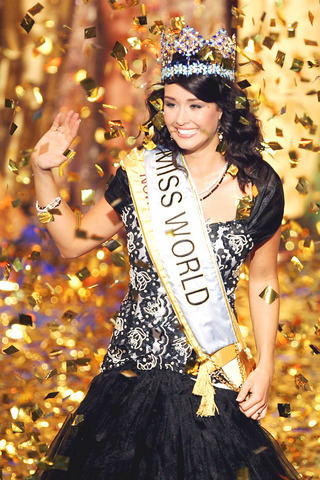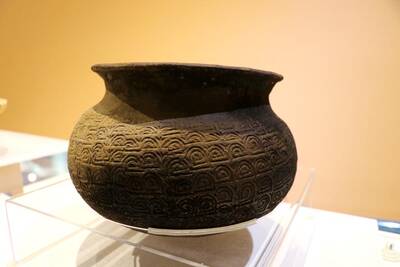Iceland's Unnur Birna Vilhjalmsdottir began her year-long reign as Miss World on Sunday after beating 101 other girls in a global pageant staged in this sleepy resort town.
The 21-year-old Reykjavik student and daughter of Miss Iceland 1983 expressed delight and astonishment at winning the title and thanked her mother for her advice.
"It came as a big shock but the feeling is incredible -- I am numb," said the green-eyed brunette. "I did not hear my name at first. I just heard it echo around the room. I only knew it was me because nobody else moved.

PHOTO: AP
"My mum gave me some advice for how to behave, and it seems to have worked," Vilhjalmsdottir said. "She told me to be myself, not be fake in any way, and to relax. I am so pleased that she was able to be here to see me win the title."
Vilhjalmsdottir will serve as a goodwill ambassador and charity fund-raiser for children's causes throughout next year and is likely to profit from a host of modeling and acting contracts.
Organizers said Saturday night's pageant, in its 55th edition, reached an estimated audience of 2 billion.
Runner-up was Miss Mexico Dafne Molina Lona, representing the Americas, while the third place went to Miss Puerto Rico Ingrid Marie Rivera Santos, representing the Caribbean zone.
Vilhjalmsdottir's mother Unnur Steinsson represented Iceland in 1983 and came in the top five in the global contest.
"I am just speechless," Steinsson said. "There are simply no words to describe my feelings right now. I am now totally beside myself with joy to see her as Miss World."
Vilhjalmsdottir is a student from Reykjavik who has interned as a policewoman during her summer holidays while studying anthropology and aspiring toward a career in law.
Winning the coveted title is likely to change her life, as she embarks on a rigorous year of charity appearances and advocating humanitarian causes.
"In the coming year I want to do just as much as I can to help," she said. "I would love to do what I can do for charity and for the children of the world."
Vilhjalmsdottir beat finalists from six zones, including Miss Italy Sofia Bruscoli, awarded the title of Miss South Europe, Miss Tanzania Nancy Abraham Sumary, who was named Miss Africa, and Miss Korea Oh Eun-young, who was crowned Miss Asia Pacific.
The cherished title "Beauty With A Purpose" also went to Miss Korea, an award commemorating her humanitarian fund-raising and charity work.
Miss Russia Yulia Ivanova won the bathing suit section, while Miss America Virgin Islands Kmisha-Victoria Counts won the talent contest with her soul singing.
This year, for the first time, all nine judges were former Miss World title holders, inclu-ding Miss World 1953 Denise Perrier Lanfranchi of France.
Vilhjalmsdottir takes over from Maria Julia Mantilla Garcia, who in a year of globetrotting visited tsunami-hit Banda Aceh in Indonesia as well as Russia, Tibet and her native Peru, where she worked to improve children's education.
The venue of next year's contest has not yet been announced.

Sept. 1 to Sept. 7 In 1899, Kozaburo Hirai became the first documented Japanese to wed a Taiwanese under colonial rule. The soldier was partly motivated by the government’s policy of assimilating the Taiwanese population through intermarriage. While his friends and family disapproved and even mocked him, the marriage endured. By 1930, when his story appeared in Tales of Virtuous Deeds in Taiwan, Hirai had settled in his wife’s rural Changhua hometown, farming the land and integrating into local society. Similarly, Aiko Fujii, who married into the prominent Wufeng Lin Family (霧峰林家) in 1927, quickly learned Hoklo (commonly known as Taiwanese) and

The low voter turnout for the referendum on Aug. 23 shows that many Taiwanese are apathetic about nuclear energy, but there are long-term energy stakes involved that the public needs to grasp Taiwan faces an energy trilemma: soaring AI-driven demand, pressure to cut carbon and reliance on fragile fuel imports. But the nuclear referendum on Aug. 23 showed how little this registered with voters, many of whom neither see the long game nor grasp the stakes. Volunteer referendum worker Vivian Chen (陳薇安) put it bluntly: “I’ve seen many people asking what they’re voting for when they arrive to vote. They cast their vote without even doing any research.” Imagine Taiwanese voters invited to a poker table. The bet looked simple — yes or no — yet most never showed. More than two-thirds of those

In the run-up to the referendum on re-opening Pingtung County’s Ma-anshan Nuclear Power Plant last month, the media inundated us with explainers. A favorite factoid of the international media, endlessly recycled, was that Taiwan has no energy reserves for a blockade, thus necessitating re-opening the nuclear plants. As presented by the Chinese-language CommonWealth Magazine, it runs: “According to the US Department of Commerce International Trade Administration, 97.73 percent of Taiwan’s energy is imported, and estimates are that Taiwan has only 11 days of reserves available in the event of a blockade.” This factoid is not an outright lie — that

The People’s Republic of China (PRC) yesterday paraded its military hardware in an effort to impress its own population, intimidate its enemies and rewrite history. As always, this was paced by a blizzard of articles and commentaries in the media, a reminder that Beijing’s lies must be accompanied by a bodyguard of lies. A typical example is this piece by Zheng Wang (汪錚) of Seton Hall in the Diplomat. “In Taiwan, 2025 also marks 80 years since the island’s return to China at the end of the war — a historical milestone largely omitted in official commemorations.” The reason for its